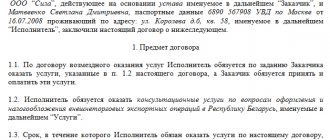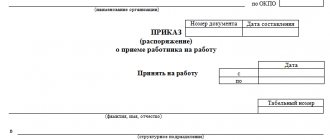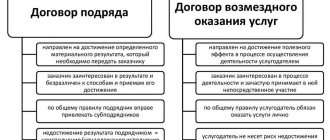Home / Labor Law / Employment / Hiring
Back
Published: 07/01/2016
Reading time: 7 min
0
3048
Financial liability according to the law is imposed on any employee guilty of causing damage to the property of his employer. However, the extent of such responsibility is not the same for everyone.
Full compensation for losses is imposed strictly in accordance with the provisions of labor and federal legislation, as well as local regulations (agreements) in force in the organization or enterprise.
In particular, the list of cases serving as the basis for compensation of losses in full is indicated in Article 233 of the Labor Code.
- Who can be held responsible?
- List of positions and works First list
- Second list
- Third list
Financial liability at the enterprise
While doing his job, sometimes an employee can damage the property of his company. In each such situation, the law provides for the presence or absence of an obligation to compensate for the damage caused. It is important to note that the need to pay is not automatic.
The manager is interested in the following:
- employees took care of property that belonged not to them, but to the company;
- in case of damage, loss or destruction of valuables, receive equivalent compensation.
The legislation provides for the possibility of signing a certain agreement with the employee, suggesting that from now on his responsibility is full. The employee cannot be forced to put his signature on it. By refusing, he does not receive increased responsibility, but also does not have the opportunity to continue to fulfill his production duties.
The scope of liability depends on the following circumstances:
- Legislative provisions relevant to this area.
- The presence of the employee's fault.
- Did he sign a liability agreement?
- What type of harm are we talking about?
Regarding the last circumstance, you need to know that only direct immediate damage is subject to compensation. If it is indirect, then we are not talking about material liability. In particular, when resolving the issues under consideration, lost profits should not be compensated.
At each work site, activities related to the accounting and use of material assets may occur, but not all employees will be fully responsible for their loss or damage.
Responsibility of this kind can be individual or collective. The latter option is used when it is not possible to distinguish between the culpability of individuals in the event of loss or damage to property. In the latter case, it is possible to avoid punishment or reduce it by proving your complete or partial innocence.
Inventory
The act is sufficient to transfer a cash register, similar items or a small amount of valuables (for example, when transferring a car to a new forwarding driver). If the matter concerns a warehouse where the volume of material assets is large or geographically dispersed, then an inventory commission is created by order of the enterprise.
The regulations for conducting inventories are established by the Methodological Instructions of the Ministry of Finance of Russia No. 49 dated June 13, 1995. The Commission is appointed by order of the head. In addition to responsible employees, it traditionally includes a representative of the administration, accounting department, and specialists who understand the specifics of the storage facility in order to accurately identify inventory items.
This procedure is the same for any organization and involves a complete quantitative recalculation of inventories. Upon completion of the recount, the keys are transferred to the new storekeeper; until the transfer procedure is completed, the accepted warehouses are sealed.
The final balances on the date of the inventory reflected in the accounting registers must coincide with the control sheets. Deviations are recorded in the matching sheet, surpluses are credited, shortages are entered in a separate act. The decision to write off shortages or reimburse the cost of missing property to the former MOL is made by the head of the enterprise.
In different fields of activity, different people bear responsibility. Naturally, they receive an additional payment for this. They have a greater risk of being fired. Also check out how:
- a collective responsibility agreement is drawn up;
- collected;
- prosecution occurs (even for environmental violations);
- an employment contract is drawn up.
The legislative framework
The rules for financial liability of company employees are based on Chapters 37 and 39 of the Labor Code of the Russian Federation. Certain rules are contained in various federal laws.
Article 233 of the Labor Code of the Russian Federation describes situations in which the employee is charged with full financial responsibility for causing harm.
The law that regulates accounting (No. 402-FZ) states that in the event of dismissal or vacation of a financially responsible person, the company must make an inventory of the values for which he must be responsible.
Reporting
In order to monitor the activities of the responsible employee, various forms of reporting are mandatory at the enterprise.
The reporting period and deadlines for submitting documents are established by the head of the enterprise and depend on the need to update information about material assets and volumes and the type of activity of the organization. The responsible person can inform his management about the movements of the things entrusted to him daily, once a week/month/quarter, etc.
All changes and movements of material assets are recorded in writing and documented. It contains:
- General information – details of the organization, reporting period, report number, etc.;
- Information about entrusted material assets at the beginning of the period - amounts, prices, accompanying documents, etc.
- Information about entrusted material assets at the end of the period.
- The result is balances (of goods, things, documents, banknotes and other valuables) and documents confirming the movements of these valuables (receipt and expense cash orders, commodity and delivery notes, etc.).
The report is drawn up in 2 copies and signed. responsible person.
The data entered in writing is compared with the attached documents.
Accounting for fixed assets for which a person is responsible is carried out using:
- Inventory list of fixed assets;
- Log book;
- Book of accounting of material assets;
- Cards for recording material assets;
- Other documents depending on the specifics of the position held.
The forms of this documentation can be found in the Labor Code and Resolutions of the Government of the Russian Federation.
When checking and identifying a shortage of fixed assets or their damage, the person who signed the agreement on full financial responsibility may not only receive a reprimand entered into his personal file, but also be suspended or dismissed. In this case, the employee will be fully compensated for the damage. The degree of punishment depends on the degree of guilt of the employee.
Another very important document is a receipt from the financially responsible employee , which is drawn up according to the approved form (P - 52).
It is filled out and signed by the employee personally before the start of the inspection, audit, inventory and is proof that there is no unaccounted money, documents and valuables, and everything else is included in the report.
Report of the financially responsible person - sample.
List of positions of financially responsible persons
Full financial responsibility is borne not only when the agreement in question is signed, but also in some cases. Here is a complete list of such situations:
- Upon conclusion of the relevant agreement.
- When an employee received valuables and there is a properly executed document that confirms this.
- The damage or theft was carried out with intent.
- The harm was caused by those who were under the influence of alcohol, drugs or other similar substances.
- If the reason was the disclosure of classified information protected by law.
- The damage was caused by a person who was not performing his job duties at that time.
If we are talking about a minor, then only item 4 from this list can be applied to him.
The concept of “object” or “subject” of liability
The concept of “object of liability” includes property that must be constantly monitored by a responsible person.
The assignment of the object is made to one of the employees of the enterprise, whose financial responsibility is confirmed by its registration in accounting records. If this object was damaged, then the person who was responsible for it is obliged to reimburse its cost or pay for the purchase of a new object with his own money.
Reference! In turn, the “subject of material liability” is a person who, in connection with the order, was appointed to guard the property.
Also, the subject of material liability is a person who has committed illegal actions in relation to a property object and is now obliged to compensate for losses.
A person can be subject to this type of liability only if the following rules are met:
- majority;
- The position at work is financially responsible.
The responsibilities of the subject of liability include the following:
- it is required to treat property transferred to a person for safekeeping with caution;
- you must immediately notify your boss of any situations that even indirectly threaten the safety of the object of financial responsibility;
- It is imperative to keep records of the condition of the object and its inventory.
If the property was damaged in some way, then the person responsible for it, before paying the penalty, must familiarize himself with the requirements for the manager who entrusted him with control over the object.
The manager has the following responsibilities:
- the superior must create optimal conditions for the safety of the object transferred under the responsibility of the subordinate;
- it is imperative to familiarize the employee with the regulations that present all the rules for storing the object transferred under responsibility;
- It is imperative to periodically take inventory of property.
Attention! If at least one of the manager’s duties was not fulfilled, then the financially responsible employee has every right to demand a reduction in the amount of the penalty, up to complete release from duty.
The calculation of the funds that the employee is obliged to reimburse is equal to the market prices on the day when the object entrusted to the protection was damaged. The amount of damage caused cannot be lower than the value of the object to which the damage was caused. The amount of the penalty is also calculated taking into account exactly how damaged the object entrusted to the protection is.
Read more about who a financially responsible person is, about his rights and responsibilities, in this article, and you will learn about who is financially responsible before conducting an inventory here.
Who can be appointed financially responsible?
An agreement providing for the full amount of financial liability can be signed, in accordance with the Labor Code of the Russian Federation, only with those who occupy positions included in the following list:
- employees performing the duties of cashiers or controllers;
- managers, as well as their deputies, employees who are engaged in depository activities related to securities or banknotes;
- managers, heads of organizations or departments that relate to trade, catering, hotels, consumer services, as well as their deputies, sellers working in this area, professional commodity experts;
- bosses and employees working in the warehouse sector, servicing storage lockers, pawnshop employees, persons at enterprises and departments involved in procurement, transportation, recording availability, ensuring storage, issuing various valuables;
- managers and some pharmacy employees;
- laboratory assistants in universities and employees who manage libraries.
However, liability provided for by law is also possible. To implement it, you need to determine for which category of loss and to which employees the norm applies. Here is one example. The mail item was lost. The one who received it is responsible for it. This norm is enshrined in the “Law on Communications” (No. 126-FZ).
The document in question is also signed with the chief accountant, if necessary.
It must be taken into account that assigning a high level of responsibility to a person is possible only with his consent. The document in question must be drawn up with it. Minors cannot sign such an agreement. It is beneficial for the enterprise that they are regulated in detail. Sometimes they are added to job descriptions.
Collective responsibility
Article 243 of the Labor Code of the Russian Federation (part 1, paragraph 2) provides for collective (team) financial liability when the property (inventory) entrusted to an employee has access to a whole circle of persons who directly use or service them.
In this case:
- An order is issued at the enterprise to appoint an object of collective responsibility, and a foreman is appointed by the same order;
- An agreement is concluded with the employees, which is signed by each member of the team. Upon dismissal and acceptance, the document is not canceled or reissued; a note about the date of dismissal is simply made next to the signature of the person leaving and the sheet of signatures is supplemented with new names.
What work does the financially responsible person perform?
Such a document is drawn up with those who deal with the following:
- Reception and issuance of cash to citizens and organizations.
- Payment of various types of obligatory payments: taxes, utility bills, fines.
- Making purchases or sales.
- Warehouse work.
- Hotel room service.
- Receiving household appliances from citizens and performing repairs.
- Professions involved in cargo turnover.
- Liquidation in accordance with the procedure established by law of old banknotes or securities.
- Car repair, sale of spare parts to citizens.
- Participation in the circulation of gold and precious metals.
- Other professional duties where employees are directly related to the circulation of various valuables.
After completing the relevant documents, the following responsibilities are established for such a person:
- Take care of saving things, take measures to prevent possible theft or damage.
- If there is a threat of harm, such an employee is obliged to warn the manager about this.
- The financially responsible person is obliged to keep records of the items entrusted to him and regularly provide relevant reports.
- Such a person must participate in inspections of the property entrusted to him.
The company is obliged to ensure the following:
- Provide such working conditions so that he can ensure the safety of property.
- The enterprise is obliged to notify of any changes in legislation or local regulations related to the area of liability.
- Checks of the presence and condition of items entrusted for preservation should be carried out regularly.
It is important to understand that although the company must provide conditions to maintain the safety of the property, usually many people have access to it. Thus, safety depends not only on who is responsible.
How to recover damages from MOL
The manager is the financially responsible person. This means that his MO is complete, and if damage is caused to the company, he will compensate it in full. He has a month to comply with the requirement voluntarily. Further collection occurs in court. The same applies to any other MOL.
If the employee did not sign the corresponding contract, he is responsible only for causing harm:
- intentional;
- in a state of intoxication;
- as a result of a crime or administrative offense;
- in the form of disclosure of trade secrets.
In accordance with Article 248 of the Labor Code of the Russian Federation, if the amount of damage does not exceed the average monthly earnings, an order from the employer is sufficient to take measures. If the damage was greater, there should be a trial.
Storekeeper job description
How to draw up a contract
This paper details the rights and responsibilities of the employee who bears full responsibility. The agreement can be drawn up immediately after the employee is hired or at a time when it becomes necessary. This is done when an employee deals with valuables at his workplace, for the safety of which it is necessary to take measures.
The document must reflect the following information:
- Who signs the agreement?
- The responsibilities of the person and the business are listed.
- It specifies exactly what is now required of the employee.
- The day from which the document gains legal force is indicated.
- At the end of the page they put signatures and give their explanation.
Two copies are needed. One is taken for storage by the company, and the other remains with the employee. Usually, for registration, the director writes an order assigning full responsibility to the employee. Sometimes such things are specified in the job description.
After completing the above documents, it is necessary to formalize the transfer of valuables under the appropriate act, which will indicate their detailed list.
When does full responsibility begin?
According to Article 233 of the Labor Code, full liability occurs in the following cases:
- When such responsibility is provided for by labor or federal legislation or it is laid down in a local regulatory document, and it does not contradict labor (federal) legislation.
- If valuables were discovered missing and they were entrusted to the employee in accordance with an agreement or a one-time power of attorney.
- If the damage was caused by the employee with malicious intent and this is documented.
- If the damage was caused in an inadequate state (for example, it is proven that the driver got behind the wheel of a vehicle while drunk or was under the influence of drugs).
- If the employee’s guilt is proven by a judicial authority and criminal acts (for example, theft) were discovered.
- If the relevant government body has imposed an administrative penalty for the employee’s actions that led to losses for the employer.
- If information related to secrets (state, commercial or official) according to federal law was disclosed.
- If the damage is caused due to negligent actions and improper performance of labor or official duties.
Also, responsibility of this kind may be local in nature - its limits are indicated in the employment contract.
For example, accountants and deputy heads of organizations, institutions and enterprises are liable for damage caused through their fault in full.
It should be noted that the list in Article 233 of the Labor Code is exhaustive - it cannot be supplemented or changed at the request of the management of the organization or enterprise.
And managers are fully responsible for the property of organizations and enterprises in accordance with Article 277 of the Labor Code.
Dismissal due to moving to another city is an important reason for canceling “work off”. How can you punish workers without breaking the law? Read about this in our article. Read about what the seller should do if a shortage is discovered here.
Recovery of damages
When damage has been caused to company property, the perpetrator must pay within the limits of the wages received. The required amount is calculated based on accrued and received wages for the last 12 months. Whatever the loss, only this amount can be recovered by law. The employee is given a month to voluntarily pay compensation. Otherwise, the money can be obtained through the court.
When the employee has completed the appropriate paperwork, he will have to give back the money, fully compensating for material losses.
The method of calculation may be determined by agreement with management. For example, both parties may set up a repayment schedule for the debt, with payments to continue over several months or years. A situation is possible when the guilty person carries out repairs at his own expense or pays with his property. However, this can only be done with the consent of management.
If the person at fault was fired before payments were completed, the remaining amount may be paid voluntarily or demanded through legal action.
There are situations when the law exempts you from having to answer. This happens in situations like the following:
- Damage occurred from natural disasters or military operations.
- There was a threat to the life of a responsible employee and there was no way to eliminate it.
- Sometimes problems occur due to natural risks that are within the normal range.
Responsibility is removed when the boss has not created the necessary conditions for the responsible person to perform his functions.
Although the enterprise has the right to receive appropriate compensation, it is not obligated to do so. Due to extenuating circumstances, the debt may be fully or partially forgiven. It may also be possible, by mutual agreement, to provide for installment payments when making payments.
Mathematical responsibility in the job description
In this article, we primarily consider full ML. That is, we are talking about the job description of financially responsible persons. As noted earlier, these include a certain category of employees provided for in the List.
If we talk about limited MO and professions not listed in the List of professions, then there is no need to specifically include clauses on incomplete financial responsibility in such instructions.
In turn, the instructions with the condition of 100% compensation indicate work related to the direct use and maintenance of the property that was entrusted to the citizen. In this case, the work must comply with the List (decision of the Dzerzhinsky District Court of Perm dated 04/09/2015 in case No. 2-1584/2015).
Note! Indication of the condition for 100% compensation in the job description without concluding a corresponding agreement will become the basis for releasing the employee from the obligation to compensate for damage in full (appeal ruling of the Supreme Court of the Komi Republic dated July 19, 2018 in case No. 33-4155/2018).
And on the contrary, if professions and types of work are not included in the List, then it is also unlawful to conclude an agreement on 100% compensation and include the condition of full financial responsibility in the job descriptions of such employees (appeal ruling of the Supreme Court of the Republic of Tajikistan dated July 14, 2014 in case No. 33-9528 /2014).
For example, the court declared illegal the execution of an agreement on full MO with the head of the information technology department, since such a labor function is not in the List (appeal ruling of the Supreme Court of the Komi Republic dated June 20, 2016 in case No. 33-4052/2016).
ConsultantPlus talks about the specifics of dismissing a financially responsible person in a ready-made solution. If you do not yet have access to the ConsultantPlus system, you can obtain it free of charge for 2 days.









